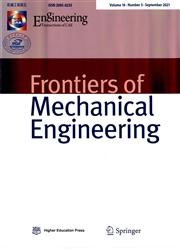社论:工程材料和部件的结构完整性和耐久性
IF 4
2区 工程技术
Q1 ENGINEERING, MECHANICAL
引用次数: 0
摘要
工程部件和结构细节在使用中可能受到完全不同的载荷条件:高周或低周疲劳(恒定或可变振幅),静态载荷和/或超载,振动,蠕变,应力腐蚀-仅举几个例子。无论荷载条件如何,结构细节的结构完整性评估必须确保有足够的安全裕度,以防止意外破坏和潜在的灾难性后果。这一目标是通过使用理论、数值和实验方法来实现的,通常是结合使用的。例如,用于估计基本材料特性的实验室测试,或用于验证实现合适强度模型的有限元分析的全尺寸测试。通常,科学研究通过提出非常规的强度标准,开发数值技术,或测试特定类别的传统和先进材料的耐久性,分别处理这些领域。本研究课题的四篇论文通过理论和/或实验研究的方式解决了上述研究课题的一些问题,涵盖了从机械到土木工程的应用领域。Gaidai等人提出了一种基于极值统计和二元校正的浮式风力机系泊系统极端响应预测方法。作为一个案例研究,该方法应用于一个10兆瓦的大型三叶片FWT。利用开源仿真工具FAST (Fatigue, Aerodynamics, Structures and Turbulence)对FWT进行气动-水-弹-伺服全耦合动力学分析。FAST工具除计算结构动力响应外,还计算叶片上的气动载荷和半潜式浮子上的水动力载荷,最终返回风机在不同工况下的锚锚拉力和喘振运动的时间序列,在OPEN ACCESS中进行处理本文章由计算机程序翻译,如有差异,请以英文原文为准。
Editorial: Structural integrity and durability of engineering materials and components
Engineering components and structural details may be subjected in service to quite different loading conditions: high-cycle or low-cycle fatigue (with constant or variable amplitudes), static loadings and/or overloads, vibrations, creep, stress corrosion–just to cite a few examples. Whatever the loading condition, an assessment of the structural integrity for a structural detail must ensure an adequate safety margin against unexpected failures with potential catastrophic consequences. This goal is pursued by the use of theoretical, numerical and experimental approaches, often combined. For example, laboratory tests to estimate fundamental material properties, or full-scale tests to validate a finite element analysis implementing suitable strength models. Most often, scientific research deals with each of these areas separately, by proposing unconventional strength criteria, developing numerical techniques, or testing the durability of specific categories of traditional and advanced materials. The four papers of this Research Topic address some of the above-mentioned Research Topic by means of theoretical and/or experimental studies that cover application areas from mechanical to civil engineering. The paper by Gaidai et al. presents an approach to predict the extreme response in the mooring system of a floating wind turbine (FWT) based on extreme value statistics and a bivariate correction approach. As a case study, the approach is applied to a 10 MW large three-bladed FWT. The fully coupled aero-hydro-elastic-servo dynamic analysis of the FWT is performed by the open source simulation tool FAST (Fatigue, Aerodynamics, Structures and Turbulence). The FAST tool computed the aerodynamic loads on the blades and hydrodynamic loads on semi-submersible floater, other than the structural dynamic response, and eventually returned the time series of anchor tension force and surge motion of the wind turbine under different operation conditions, to be processed in the OPEN ACCESS
求助全文
通过发布文献求助,成功后即可免费获取论文全文。
去求助
来源期刊

Frontiers of Mechanical Engineering
Engineering-Mechanical Engineering
CiteScore
7.20
自引率
6.70%
发文量
731
期刊介绍:
Frontiers of Mechanical Engineering is an international peer-reviewed academic journal sponsored by the Ministry of Education of China. The journal seeks to provide a forum for a broad blend of high-quality academic papers in order to promote rapid communication and exchange between researchers, scientists, and engineers in the field of mechanical engineering. The journal publishes original research articles, review articles and feature articles.
 求助内容:
求助内容: 应助结果提醒方式:
应助结果提醒方式:


